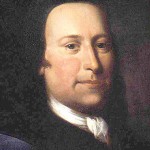Count Nicolaus Ludwig von Zinzendorf was born on this day in 1700, at Dresden. He was of noble birth, and his father died when he was six weeks old. He was raised by his maternal grandmother, a pietistic Lutheran. His education was also influenced by the pietists.
He traveled after studying law at the University of Wittenburg, and visited family estates, where he selected his cousin, Theodora, to be his wife. But her mother objected, so he chose another woman, Erdmuthe Dorothea, and they were married.
Rather than becoming a diplomat, as his family wished, he decided to concentrate his efforts on building and managing his estate. He was also not enamored with the dry Lutheran orthodoxy, and he began to look in other directions for religious fulfillment.
Around 1722, Zinzendorf offered asylum on his estate to a group of refugees from Moravia and Bohemia, and allowed them to build the village of Herrnhut on his estate. It became a place of religious freedom, and attracted people who were seeking this type of environment.
Zinzendorf and the Herrnhuters felt a strong identification with the writings of Moravian Bishop Comenius and incorporated many of the ideas of the early Unity. In this renewed community, Zinzendorf was able to organize the people based on family life. However his ideas of family were centered not on a traditional nuclear family of parents and children. He wanted to break traditional family bonds by organizing communal families based on age, marital status and gender. The small groups continued but were organized into “choirs” based on age, marital status, and gender.
Zinzendorf’s theology recognized that at each stage of life, we have different spiritual needs and a different relationship with the Savior. Moravian communities based on this model, such as Bethlehem and Salem, were designed for the sole purpose of serving Christ, who also was considered to be the community leader.
Zinzendorf was consecrated a bishop at Berlin on 20 May 1737. He traveled to Pennsylvania in 1741. He wrote a large number of hymns, and his sermons were collected into published volumes.
Another accomplishment accredited to Zinzendorf is his Common Table Prayer, also called the Moravian Blessing, “Come Lord Jesus, our Guest to be, and bless these gifts bestowed by Thee.”
Count Zinzendorf passed away in 1760. His name resounds in Winston-Salem because of the Zinzendorf Hotel that was built and burned in 1892, and the second Zinzendorf Hotel that was built in 1906 and stood until the 1970s.
Photo courtesy of Forsyth County Public Library Photograph Collection.





